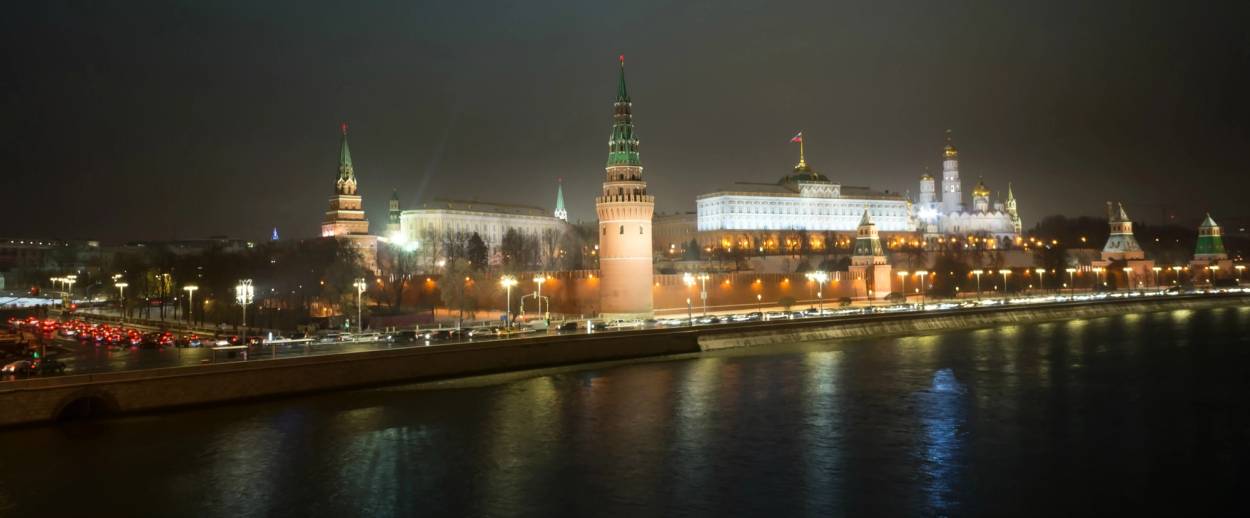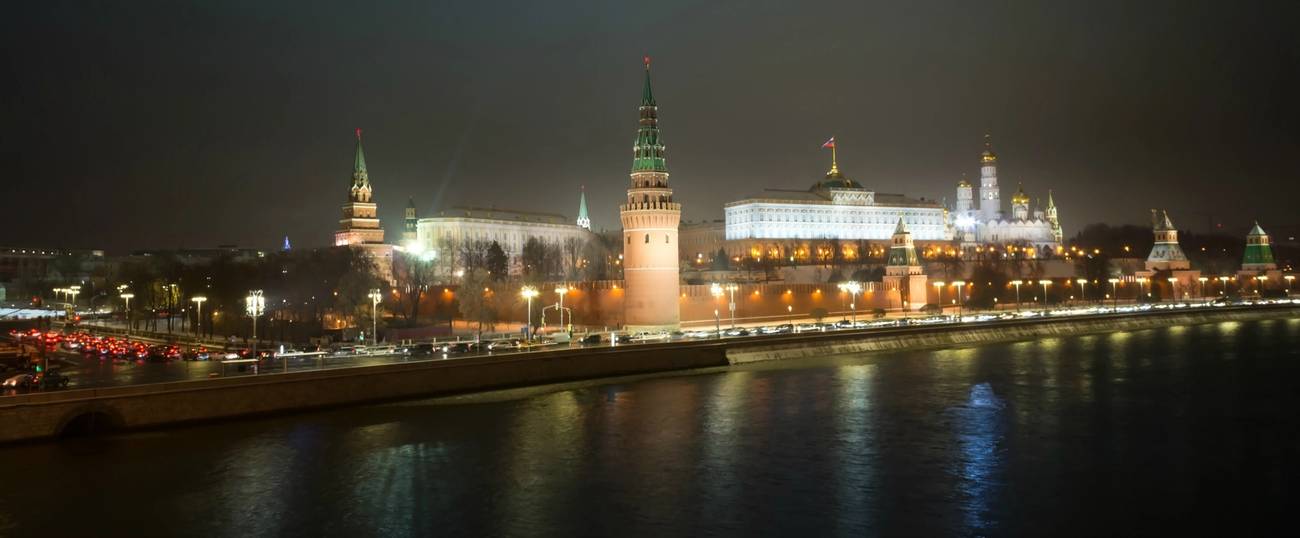Kompromat vs. Maskirovka
Whether Putin has compromising material on Trump or not, he has already succeeded in compromising America’s political culture




Yesterday, after having gone six months without a proper press conference, Donald Trump was forced into one in the midst of a breaking espionage scandal. A secret dossier had appeared, compiled by a British intelligence operative who was now on the run after the BBC had blown his anonymity and shown his picture on television. The unverified dossier included revelations that Trump associates or campaign figures had secretly met with Russian officials and concluded a deal which would include the conclusion of sanctions against Russia and allow Putin to have his way with Ukraine. Russia’s part of the deal would be to obtain and deliver compromising material on the Democratic National Committee. The most salacious revelation, however, was about Trump’s 2013 stay at the Moscow Ritz, during which he had allegedly hired a pair of prostitutes to defile the hotel bed in which the Obamas had once slept. A week before he would become leader of the free world, Trump was reduced to reminding people that he was a germaphobe.
The Russian concept of “kompromat” describes the spycraft practice of gathering compromising personal information, which is then filed away for later use in blackmailing operations. The technique was a beloved tactic of Soviet security agencies and was deployed against both domestic and foreign opponents of the Soviet Union. The Kremlin’s powerful Spokesman Dmitry Peskov dismissed the dossier however as “complete fabrication and utter nonsense,” and swore to the heavens that Putin’s government “does not engage in the collection of compromising material.” Likewise, Nikolai Kovalyov, Putin’s predecessors as head of Russia’s Federal Security Service, the successor to the KGB, also denied Moscow ever gathering any compromising secrets about Trump’s activities on his many business visits to Moscow over the years. That none of these revelations have surprised (or convinced) anyone in Russia is revealing, but what is far more concerning is the fact of their exportation to American soil.
Though the lessons of postmodern theory are becoming more germane by the day for understanding our political situation, one need not invoke “the absent mediating subject” to see that President Obama’s foreign policy has in fact been in full alignment with Putin in the Middle East for quite some time. This later also became true of Eastern Europe despite all the necessary pretenses to the contrary. Obama single-handedly ignored a bipartisan Washington consensus to arm the Ukrainians with lethal defensive weapons. In Syria, his administration stood by as the slow-motion sacking of Aleppo by Assad regime forces changed the calculus of the war. The recapture of the rebel city was accomplished by an alliance of what was left of the Syrian army, and local militias backed by Iranian Shiite expeditionary brigades and Russian special forces wearing the military patches of their new friends in Hezbollah.
A hollow man with no agenda besides winning, grifting, becoming more famous, and accumulating more money, Donald Trump never imagined that once he had grasped power he would be humiliated in this fashion. Buttressed by his immense wealth and a lifetime of power, which abetted his fleeing responsibility for his serially brackish actions, Trump is the opposite of a reflective man.
A week before he is due to become president, Trump has seen his position cardinally weakened. The damage control will continue for the duration of his presidency. Even before Trump has been sworn in, he has been radically undermined by Putin, who is winning in exactly the brutal kind of way that Trump promised his voters he would.
Just as he has in Russia and Ukraine, Putin has successfully sown epistemic doubts about what is true and what is false, and about our capacity to comprehend the concept of truth, while gaining the upper hand to continue the exact same policies he successfully urged on the last President. Even better, the claustrophobic political culture of Russian “managed democracy” is quickly being exported to America. The devious populist Stephen K. Bannon, for example, is being elevated to a consigliere position in the White House to fulfill a role that is not dissimilar from the incantatory dark magic that the “political technologist” Vladislav Surkov carries out for the Kremlin.
“Optics,” as the Obama administration understands, are well served by claims that Trump is a Kremlin agent. The broader interest of securing cover for the Obama administration’s legacy by disguising its actual alignment with the Kremlin is part of this play. Trump is left holding the bag and bearing responsibility for whatever happens. If Trump now aligns with Putin (unilaterally drops sanctions, de facto dissolves NATO, recognizes the annexation of Crimea, publicly abandons Ukraine), he will be open to attack from the Democrats led in semi-retirement by Obama—while in fact continuing with Obama’s actual core policies in the Middle East and Eastern Europe, which simply could not have been more favorable to the Kremlin, especially over the past three years. If, on the other hand, Trump splits with Putin and confronts Russia, the Kremlin will have the kompromat hanging over him, real or fake—which the American media will all too eagerly disseminate. It seems obvious under that calculation that the winners in this scenario are Putin and Obama and the loser is Trump. “Sad,” as the new commander-in-chief might pronounce.
It is important to recall how unlikely this whole situation may have seemed just a few months ago. Moscow, not unlike many other ostensibly rational actors, placed its wager on a Clinton victory while also hedging its bets and methodically feeding the Trump campaign scraps of toxic intel.
Kyiv, on the other, hand bet heavily on Clinton and crossed the rubicon into exactly the sort of manipulation with which American liberals had accused the Russians—minus the skill, grace, results and deniably. It has long been known to us journalists and analysts of Ukrainian politics that the Ukrainians played their hand in abominable fashion. The investigative report on their haphazard efforts to sabotage Trump published yesterday in Politico has very neatly tied together everything that we know about Kyiv’s calculations.
It was apparent to all of us in Ukraine this summer that Kyiv was funneling information on Trump campaign manager Paul Manafort’s backroom dealings with President Yanukovich and Putin through revelations of the “black ledger” of secret cash payments of the Russia-backed (and since dissolved) Party of Regions. Kyiv doubled down on warring with the Trump transition team even after the election shocker showed them that they had lost the wager. It got so bad that various British and American commentators living in Ukraine began writing 0p-eds pleading with Kyiv to hire a well-connected Republican lobbying firm.
Yet, the cruel cosmic joke on the Russians (as well as the rest of us now) is the widespread casting of blame for the election’s outcome on Moscow—which from Putin’s standpoint has both positive and negative connotations. On the one hand, the American press is making Putin out to be an evil genius who “hacked” the American election, which is fantastic for Russian domestic consumption and Putin’s approval ratings as it confirms Russian television talking points about the inherent fakeness of American democracy: American elections are now apparently no less falsified than Russian elections. On the other hand, Trump, before this scandal broke, was on track to offer positive overtures to Putin. Now, there is a huge spotlight on everything Russia-related that Trump does, which may well tie his hands in many instances and leave the decision-making to the Russia hawks whom he has appointed to crucial defense and diplomacy portfolios in his cabinet. The Russian public has been primed by Russian television to view Trump as a great friend of Russia, which there is no reason to believe he is, or will necessarily continue to be.
So what in the final analysis is Moscow’s endgame? Despite the sardonic grins on the faces of Russian Kremlin spokesmen and spooks turned statesmen as they deny ever having engaged in active measures, Moscow surely files away kompromat on myriad American elected officials. It is likely they had such material on Obama. They axiomatically have it on the Clintons. So, do they have it on Trump? It would be hard for them not to.
Yet the telling clue in this story is our knowledge that Russian intelligence agencies certainly have access to all the emails that Clinton sent from her private server as Secretary of State. All the “sordid” revelations, but actually quite bland scandal of the late campaign season involved the timed releases of John Podesta’s campaign emails through Wikileaks. The fact that none of the important emails featuring actual state secrets had been handed over to Assange—not a single email or phone call from Hillary Clinton’s personal account—intimates that the Kremlin was relatively sure that Hillary Clinton would win the election. They were always saving the truly incriminating and salacious materials to blackmail her once she became President—and they were too scared to release it during the campaign, knowing that American intelligence has its own kompromat on the billions of dollars worth of assets that Putin has pilfered from the Russian people over his decade and a half in power. This in turn suggests that they were similarly saving the best material on Trump.
The most likely meaning of the Trump dossier is therefore that it is maskirovka—a form of disinformation conveying the threat of a real compromise by publicizing implausible, fake kompromat. The message to Trump might be read as “remember every perverted thing you ever did in a hotel room.” The message to Clinton, who is also named in the dossier, would be “think about every email that you have ever sent out over your server.”
Being both maximalist and magical realist, Russian political culture had long ago catapulted far ahead of America into the realms of postmodern simulacrum. Now, American politics has been reduced—or according to one’s politics—elevated to the level of a lurid potboiler thriller. Before this election, conspiracy theories and le Carre-like machinations did not explain most things in American politics in the way that they typically do in Russia. The American body politic it turned out, has yet to develop antibodies against a potent new infection.
Vladislav Davidzon is Tablet’s European culture correspondent and a Ukrainian-American writer, translator, and critic. He is the Chief Editor of The Odessa Review and a Non-Resident Fellow at the Atlantic Council. He was born in Tashkent, Uzbekistan, and lives in Paris.